Glaucoma in dogs (i.e. high pressure within the eye) can be a painful and sight-stealing condition. Integrative veterinarian Dr. Julie Buzby explains the causes, symptoms, diagnosis, and treatment of glaucoma to help devoted dog parents feel more prepared should their dog develop glaucoma.

Your dog’s eyes are so much more than just the windows to his or her soul. Compared to humans, our canine companions have a more discerning sense of vision. Plus, they rely on their sight for all manner of day-to-day activities.
So, think about this: What would happen if your furry best friend’s sight was suddenly impaired? It is important to know that some of the diseases that can impact the eye, especially glaucoma, may not only be painful but also ultimately cause blindness.
What is glaucoma in dogs?
You may have heard of glaucoma in people, but it turns out that it can impact dogs too. Glaucoma is a medical condition that causes increased pressure within the eye (i.e. intraocular pressure or IOP). It may affect one or both eyes in dogs.
Unfortunately, glaucoma can cause severe damage to the affected eye. If nerve signals and/or blood flow to the eye’s internal structures are compromised, it can result in permanent blindness due to death of the cells that compose the retina.
To understand glaucoma in dogs, let’s first look at the anatomy of the eye.
Eye anatomy
The eye is composed of many delicate structures which work together to allow the eye to remain healthy and function correctly. Let’s define some relevant eye anatomy terms:
- Cornea—clear, outer layer on the front surface of the eye.
- Sclera—the “whites of the eyes.” This is the outermost layer of the eye (excluding the cornea).
- Retina—a thin layer of specialized sensory cells that line the inside of the back of the eye. It is responsible for capturing reflected light to send the image information to the brain via the optic nerve.
- Iris— the colored part of the eye that controls how much light moves through its opening (i.e. the pupil).
- Choroid—middle layer of the back of the eye.
- Lens—a clear, round disc behind the iris that focuses light onto the retina.
- Ciliary body—ring-shaped muscles that control the size of the pupil. It is also responsible for making aqueous humor.
- Aqueous humor—clear fluid that fills the portion of the eye in front of the lens.
- Vitreous humor—gel-like substance that fills the space between the lens and back of the eye.
- Iridocorneal angle (ICA)—the angle formed between the cornea and iris that determines how quickly aqueous humor flows out of the eye. Smaller or diseased angles will increase IOPs.
- Pectinate ligaments—a network of fibers at the ICA. The spaces in between the fibers act like drains for aqueous humor.
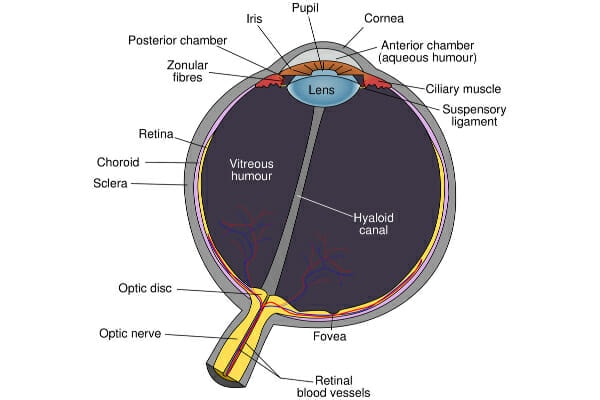
What causes glaucoma in dogs?
In glaucoma, the IOP increases because there is a decrease in drainage of aqueous humor. The aqueous humor is important for overall eye health. It keeps the lens clean and carries nutrients from blood to various eye structures. Once nutrients have been used up, it makes sense the older aqueous humor must be replaced by newer fluid.
In a normal dog, there is a delicate balance between aqueous humor production and drainage, which helps keep the IOP at a normal level. However, if aqueous humor cannot drain out of the eye via the ICA, the IOP may increase. This happens because the ciliary body is still producing new aqueous humor.
Think of it like plumbing—a damaged or clogged drain will cause water to back up in the sink if the faucet is not turned off. So, if aqueous humor cannot flow out of the eye, more of it will accumulate inside of the eye because it has nowhere else to go. And more fluid crammed into the same-sized space in the eye means the intraocular pressure will increase.
Types of glaucoma
Glaucoma is divided into two categories—primary and secondary. Primary glaucoma is typically inherited and is more common in purebred dogs. On the other hand, secondary glaucoma means that the increased IOPs are due to some other factor besides genetics. Primary glaucoma almost always affects both eyes whereas secondary may only affect one eye.
Primary glaucoma
Dogs with primary glaucoma have typically inherited one or multiple gene mutations that lead to malformations of the ICA (like closed angle glaucoma where a smaller ICA affects drainage flow) or of the pectinate ligaments (like in goniodysgenesis where the fibers are replaced by sheets of tissue). Think about this like trying to drain water through a colander with tiny holes instead of big holes.
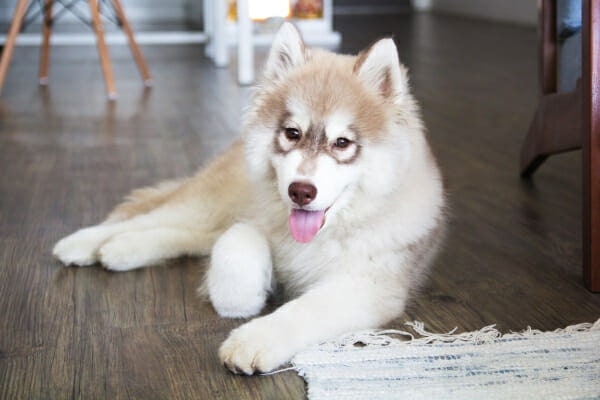
In patients with open angle glaucoma, the ICA is normal-sized but cartilage building blocks called glycosaminoglycans (GAGs) accumulate in the network of pectinate ligaments, causing a physical obstruction. This is sort of like how the drain in your shower may become slower and slower as hair accumulates in it.
There are specific breeds that are more likely to develop certain gene mutations causing primary glaucoma. Genetic testing for these mutations is available for some breeds.
Dog breeds that are more prone to developing closed angle (i.e. narrow angle) glaucoma include the following:
- Akitas
- Basset Hounds
- Chinese Shar Peis
- Chow Chows
- Cocker Spaniels
- English Springer Spaniels
- Flat-Coated Retrievers
- Poodles
- Samoyeds
- Shiba Inus
- Shih Tzus
- Siberian Huskies
Open angle glaucoma is more common in:
- Beagles
- Norwegian Elkhounds
- Petit Basset Griffon Vendéens
For both primary and secondary glaucoma, gender does not appear to influence the risk of developing glaucoma. The age of onset is variable, but for primary glaucoma, middle-aged dogs are the most affected.
Secondary glaucoma
In secondary glaucoma, there are multiple eye issues that can lead to increased IOPs. Ocular trauma and lens luxations are among the most common causes. Uveitis (i.e. inflammation of the uvea, which is composed of the iris, ciliary body, and choroid) is also a contributing factor. For example, cataracts in dogs can cause uveitis which may then lead to glaucoma. Additionally, ocular cancer can affect aqueous humor drainage from the eye.
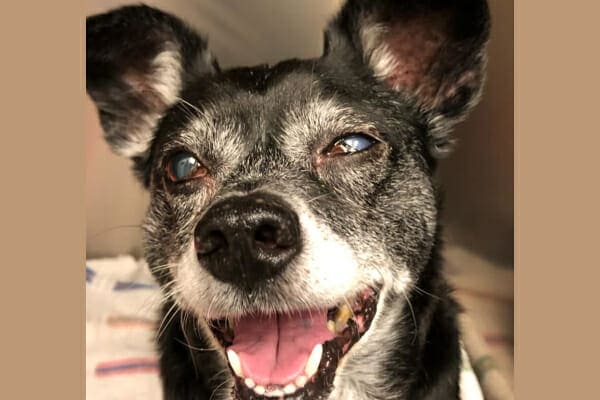
Health issues that can cause hypertension in dogs (i.e. elevated blood pressure) may also increase IOP. Some of these include heart disease in dogs and Cushing’s disease in dogs. In most cases of sudden onset glaucoma in dogs (i.e. acute glaucoma in dogs), there is an underlying problem of some sort that leads to secondary glaucoma.
Secondary glaucoma can affect most dog breeds because the contributing factors are numerous. However, Boston Terriers and Fox Terriers may be more at risk of developing lens luxations that can progress to glaucoma.
What are the symptoms of glaucoma?
Now that we’ve discussed the mechanics behind glaucoma and whom it affects, you’re probably wondering, “Is glaucoma in dogs painful?” The answer is “Yes.” In fact, glaucoma can be an extremely painful condition.
In addition to seeing signs your dog is in pain such a rubbing or pawing at the eyes or attitude changes, you may also notice the following signs of glaucoma:
- Corneal edema—a bluish-white discoloration of the cornea caused by fluid accumulation
- Episcleral injection—blood vessels that have become enlarged and more noticeable across the sclera
- Conjunctival hyperemia—redness of the normally pink tissues around the eye
- Mydriasis—dilated pupil
- Eye discharge
- Blepharospasm—excessive eyelid blinking and squinting
- Blindness
If you notice any of these signs, please make an appointment with your veterinarian promptly. Especially with sudden onset glaucoma, time is of the essence. High IOPs can damage the retina, sometimes permanently. So the sooner the vet is able to diagnose glaucoma and reduce the IOP, the better the chance of preserving the dog’s vision.
If the IOP remains elevated, a dog may progress to chronic glaucoma. Eventually, during end stage glaucoma, the eye may appear to be larger than normal (i.e. buphthalmos) and the dog may be completely blind in that eye. If the dog only has glaucoma in one eye, signs of vision loss may not always be very obvious because the “good” eye can compensate.
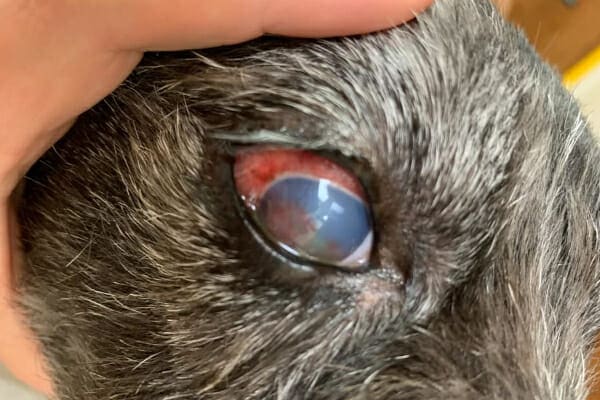
How will the vet diagnose my dog with glaucoma?
When you bring your dog to your veterinarian, he or she will perform a complete physical exam to look for signs of underlying health issues. Plus, your vet will thoroughly examine your dog’s eyes. Many veterinary clinics have a special tool called a tonometer. The vet can use the tonometer to measure a dog’s IOPs by briefly contacting the surface of the eye. Depending on the type of tonometer, your vet may place a drop of numbing solution in each eye to prevent discomfort during the examination.
Intraocular pressures are measured in millimeters of mercury or mmHg (just like atmospheric pressure). A normal range of values should be between 10 to 20 mmHg but can read as high as 24 mmHg with certain tonometer types. The vet will generally classify readings higher than 25 mmHg as abnormal. He or she may also suspect an eye issue if there is a difference of more than 8 mmHg between the two eyes.
It is important to note that one elevated value may not be enough to definitively diagnose glaucoma. The vet should repeat the tonometry and only suspect glaucoma when the IOPs are consistently high. It is also important for the veterinary team not to apply excess pressure behind the head or around the eyes when reading IOPs. This can falsely elevate the IOP. Additionally, the vet must keep in mind that IOPs can vary based on time of day or in a sedated dog.
Additional testing
Genetic tests for the mutations that lead to primary glaucoma are available for Shar Peis, Beagles, and Petit Basset Griffon Vendéens. Your vet may also recommend testing that looks for signs of other illnesses. For example, as mentioned previously, conditions that cause high blood pressure like heart disease, kidney disease, and various endocrine disorders (i.e. Cushing’s disease or hypothyroidism in dogs) can lead to secondary glaucoma.
In some cases, your vet may refer you to a veterinary ophthalmologist for further evaluation. These eye specialists have other tools for evaluating glaucomatous eyes. For example, they can use a unique lens to perform gonioscopy, which is the evaluation of the iridocorneal angle.
The overall appearance of the ICA can distinguish between secondary and primary glaucoma. They are also capable of performing some surgical procedures for glaucoma treatment and/or developing a medical management plan for cases of glaucoma that are difficult to control.
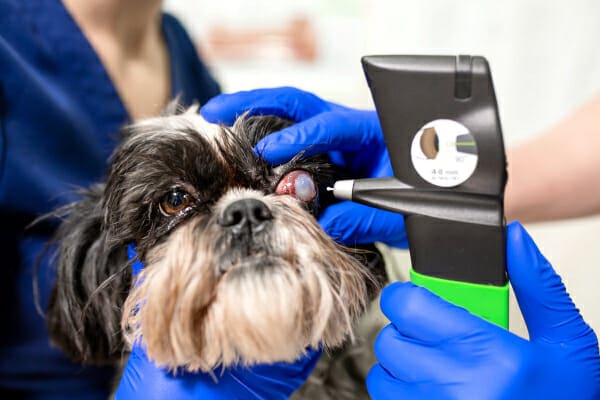
What is the treatment for glaucoma in dogs?
Once your vet diagnoses your dog with glaucoma, he or she will discuss the different treatment options. Overall, most canines with glaucoma respond better to surgical intervention in the long run. This is especially true for dogs with primary glaucoma or with lens luxations and ocular tumors. However, glaucoma surgery can be expensive, and isn’t the right option for all dogs, so medical management may also be reasonable.
Medical options
Sometimes the veterinarian may recommend starting with glaucoma eye drops or oral medications. These include:
Prostaglandin analogues
As mentioned earlier, acute glaucoma may damage the retina, leading to blindness. So in an emergency situation, severely elevated IOPs may warrant the use of a medication that rapidly lowers pressures in order to ideally preserve a dog’s sight. A class of topical eye medications called prostaglandin analogues can help with this. These medications, such as latanoprost, decrease resistance to aqueous humor outflow.
It is worth noting that prostaglandin analogues are only intended for short-term use. Additionally, they may cause temporary blindness because they constrict the pupils.
Carbonic anhydrase inhibitors
The most common type of glaucoma medication for long-term use is dorzolamide, which is a carbonic anhydrase inhibitor (CAI) drug. Inhibition of the enzyme carbonic anhydrase will decrease aqueous humor production. As a result, the IOP becomes lower.
Beta blockers
Your vet may also prescribe beta blocker medications like timolol because they also decrease the production of aqueous humor by the ciliary body. However, your vet must be cautious when using this drug in dogs with airway problems or heart disease.
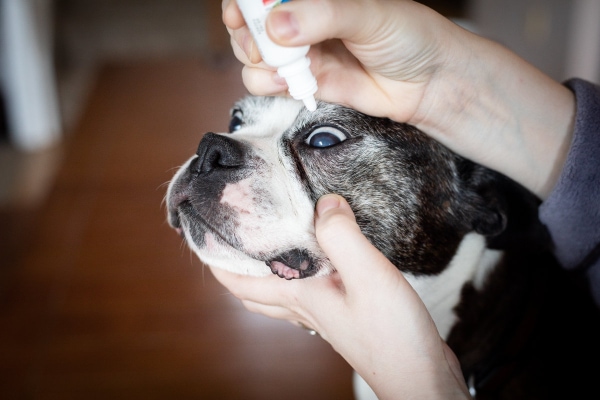
Additional medications
If your dog develops secondary glaucoma due to uveitis, your vet may recommend topical steroid therapy. Additionally, all dogs with acute onset glaucoma and some with chronic glaucoma can benefit from oral pain medications.
In the event that medical management fails or is not an option, surgical treatment will be necessary. The surgical technique that the vet or veterinary ophthalmologist selects will depend in part on whether or not your dog still has vision in the affected eye.
Surgical options for visual eyes
If the dog can still see, the goal of surgery is to manage IOP and preserve vision for as long as possible. One option is a procedure called cyclophotocoagulation. In it, the veterinary ophthalmologist uses a surgical laser to destroy a part of the ciliary body. Doing so causes a decrease in aqueous humor production.
Sometimes, the veterinary ophthalmologist can implant a shunt that diverts aqueous humor around a diseased ICA so that it can leave the eye. This surgery is called gonioimplantation. The ophthalmologist may choose to combine it with cyclophotocoagulation in more difficult cases.
Finally, if the dog has a concurrent lens luxation, the veterinary ophthalmologist can surgically remove the lens. This should improve the secondary glaucoma.
Surgery for blind dogs
Unfortunately, sometimes glaucoma causes permanent blindness. In that case, the focus switches to keeping the dog as comfortable and pain-free as possible.
Enucleation
It may sound scary, but sometimes enucleation surgery is the best option for dogs with painful, blind eyes who are in end stage glaucoma. For this procedure, the vet or veterinary ophthalmologist will surgically remove the entire glaucomatous eyeball. From a cosmetic standpoint, your canine companion will look like he or she is permanently winking at you.
Although it may be difficult to think about your dog losing an eye, the great thing about enucleation is that it provides immediate relief from pain and discomfort. Dog parents often report that their dog starts acting like a puppy again after surgery because he or she is not in constant pain from the eye anymore. Additionally, enucleation is typically less expensive than the other surgical procedures and does not require specialized equipment. This often means your family veterinarian can perform the enucleation surgery.
I have run into many clients over the years who balk at the idea of enucleation. I get it. Your dog’s eyes are a beautiful, expressive part of who he or she is. But when his or her eyes are also extremely painful and no longer visual, something has to give. You might have to be willing to trade your dog’s eyes for more good days. In my opinion at least, that is a trade well worth making.
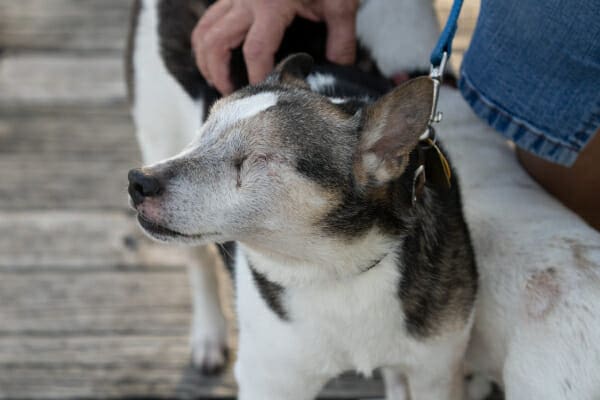
Intraocular prosthesis
If you would like to avoid enucleation surgery, your veterinary ophthalmologist can discuss a few other options. One involves the veterinary ophthalmologist removing the eye’s internal structures and replacing them with an ocular prosthesis for dogs. Some dog parents find this type of surgery more cosmetic than an enucleation. Plus, it does still provide pain relief. However, it is not a good option if the dog has ocular cancer, dry eye in dogs, chronic inflammation, or chronic corneal disease.
Gentamicin injection
Another procedure involves injecting gentamicin, an antibiotic, into the eye in order to destroy the ciliary body. This is only useful for cases of chronic glaucoma and has a 65-80% success rate. Ultimately, you may still need to consider enucleation if this procedure fails.
Are there home remedies for glaucoma in dogs?
There aren’t really any home remedies for glaucoma in dogs, but that doesn’t mean that what you do at home doesn’t matter. For example, it is important to administer the glaucoma eyedrops or oral medication according to your veterinarian’s instructions. And it is also critical to follow any post-op instructions should your dog have glaucoma surgery. Good nursing care and appropriate medication use can go far in helping your dog be as comfortable as possible.
If your dog is blind, there are also some things you can do to help him or her adjust. Although I didn’t design Dr. Buzby’s ToeGrips® dog nail grips with blind dogs in mind, I have had numerous people testify to how much they helped their blind dogs navigate the world with confidence. Being unsure of your footing can be unnerving for any dog, but especially for a blind dog. So it makes sense that the added traction of ToeGrips for blind dogs can be very reassuring.
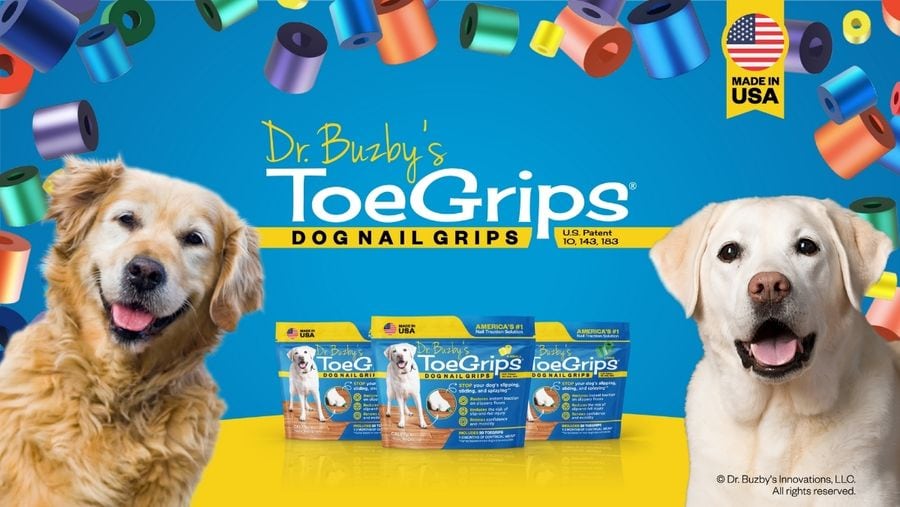
You can also help your blind dog by:
- Keeping furniture in the same location
- Always having the food and water in the same place
- Placing a rug or different textured surface at the doorways or stairs to help the dog know what is coming up
- Frequently talking to your dog so he or she knows where you are and feels reassured in new situations
For more ideas, check out my blog 7 Tips For Living With A Blind Dog.
What is the outlook for dogs with glaucoma?
Unfortunately, almost all dogs with primary glaucoma will eventually become non-visual. For dogs with secondary glaucoma, the prognosis depends on the cause since some causes are more treatable than others. Either way, it is important to remember that end stage glaucoma in dogs can be extremely painful. Please seek veterinary care as soon as you see the early signs of glaucoma. Prompt medical and/or surgical treatment can help your dog to be comfortable and visual for as long as possible.

When to put down a dog with glaucoma
The good news is that just because your dog has glaucoma, that doesn’t mean you should put him or her down right away. As you can see from the long list of treatment options I shared above, your vet has a lot of tools in the toolbox to help manage glaucoma. And even if your dog becomes blind, that doesn’t mean that his or her life is over.
Blind dogs can still have a wonderful quality of life with a dedicated owner and good pain control.
When you do get to the point where your dog isn’t coping well with being blind or you can no longer get the pain under control, then it may be time to have a conversation with your vet about whether preparing for your dog’s euthanasia is the kindest option.
But until then, keep your eyes on the future. Take steps to control your dog’s IOP with medications or surgery, be willing to do what it takes to minimize his or her pain (even if that means an enucleation), and stay in close communication with your vet. Hopefully, you and your dog will be able to enjoy many more wonderful years together after a glaucoma diagnosis and make many, many more lasting memories.
Has your dear dog been diagnosed with glaucoma?
Please share his or her story in the comments.


I have a 12 year old Husky who had cataracts but over a three day period the blue eye developed Glaucoma the vet gave us eye drops and medication for the pressure. After one week the vet determined she was blind in that eye and now wants to remove it. Is there no other options?
Hi Greg,
I am sorry your Husky has lost the vision in her eye and is battling this difficult condition. As the article states, there are a few different medications that can be used to try and maintain normal eye pressures, but once vision is lost, removing the eye is the most common treatment. If the eye is nonvisual, then there is really no benefit to trying to keep the eye in place. But once the affected eye is removed, the pain is gone, and most dogs feel instantly better. I am curious to know what your concern is with the enucleation surgery. Is it the anesthesia? Or how she will look afterward? Don’t hesitate to discuss any lingering issues with your vet. You deserve to feel confident and be at peace with the choices being made. Wishing you all the best. Feel free to leave an update if you have a chance.
My 14 year old shitzhu was showing signs of glaucoma but could still run and play and jump onto his fav chair. He recently got hit by a car and we are so thankful he is still alive but his head took the brunt of the trauma and now he has lens luxation in both eyes and has eye pressure up to 70 a lot of time. He rubs his eyes constantly and is in pain. The drops we use every 3 hours only help a little. He constantly runs into things and seems disorientated but is healthy otherwise. It’s been several weeks, will he eventually get used to being blind or is the pain what is causing his disorientation? We just want him to be pain free and happy. Not sure how to help our baby?
Hi Starla,
I am so sorry your senior guy has suffered this trauma to his head and eyes. Without examining him myself, it is hard to determine what the cause of the disorientation could be. It might be a good idea to ask for a consultation with a veterinary ophthalmologist. If the treatment is not able to adequately control your pup’s pain, then removing the eyes (enucleation) may be the only way to offer relief and comfort. The specialist would be able to go over all the treatment options and answer any lingering questions you may have. Praying for a clear path forward and a positive outcome for your sweet boy.
my dog is blind, the vet thinks he is in pain and is scheduled for euthanasia. but he still plays, eats with pleasure and sleeps comfortably. how do we know if the decision is hasty? and how long can we keep the morphine?
Dear Dana,
I am sorry your boy is enduring with chronic pain. Without examining him myself, it is hard to make specific conclusions or recommendations. What is causing the pain? If your pup is requiring daily morphine to get relief, then I agree that saying goodbye may be the most loving option. I will attach links to other articles with more information. Hoping you can find the advice you need to make these tough decisions.
1. Using a Quality of Life Scale for Dogs
2. How Will You Know When It’s Time to Euthanize Your Dog? 5 Caring, Heartfelt Messages
3. Dog Euthanasia: Knowing When to Say Goodbye
4. Preparing for Your Dog’s Euthanasia: 10 Thoughts for Peace
Our dog just had an eye removed and immediately glaucoma seems to have appeared in his what we thought good eye. It happened fast almost the next day after surgery. He is so sweet and of course we hate to lose him but his quality of life seems to be over. His surgery was only a week ago. Vet gave us some drops for his eye buy it doesn’t seem to be working. The thought of putting him down is very hard and yet he doesn’t act happy and just lays around all day. He eats good and goes to bathroom but this is a hard decision to make. Because of other complications we hate to put him under for surgery an also I ‘m not sure I can do this again. Only after reading further did I realize this may be painful to him. Is it time to say goodbye.
Hi Mark,
I am sorry your dog has endured so many eye issues in such a short period of time. I wish I could tell you what was best, but without examining your pup myself, it is hard to truly evaluate his quality of life. You are right that glaucoma is very painful. I understand there may be issues that make another surgery too risky, but I also know that once the painful eye is removed it is possible your boy would feel better, and his happiness may be restored. I pray you find the answers and advice you need to make the best choice for everyone involved. Wishing you strength and comfort as you navigate this difficult path.
Tony is our 7-8 yo rescue pup. He developed diabetes about 8 months ago and was blind in both eyes within 4 months due to cataracts. We were considering having cataract surgery done but when he was assessed we were told he had a uveitis resulting in scarring that would make successful surgery unlikely. We just had a reassessment done and he has now been diagnosed with glaucoma. He is receiving 3 gtts 3x per day, but one eye still seems very distended. He doe not appear to be in any pain but my biggest fear is that he is experiencing pain. I just don’t know where to go from here. i am having a really hard time deciding what to do. My biggest concern is pain. He has also recently been diagnosed with Cushing’s disease. Is removal of his eyes, which I was originally very against, the best option?
Hi Dawme,
I understand your concern for Tony with these eye issues he is experiencing. Yes, glaucoma is painful when more advanced, and at that stage, removing the eyes can be the only way to bring relief. I will recommend enucleation for my own patients if the eyes are no longer visual, and the pressures remain high. You can have your vet, or the veterinary ophthalmologist assess the current function of Tony’s eyes to see where he is in the progression of this disease. If they think it is time to consider enucleation surgery, then I would go for it. After having their painful eyes removed, dogs feel so much better and gain some quality of life back. I hope you can find the answers you need to make the best choice for Tony. Wishing you both the best of luck and happier days ahead!
My 9 yo cockapoo is now blind in both eyes due to glaucoma. First eye became sympathetic very suddenly and he was blind within days. he lives with my ex and I don’t think he was always getting his drops. He recently lost site in the second eye. I just saw him and his eyes are bulging. It was so difficult to see. He eats and plays so my ex doesn’t think he’s in pain, but how could he not be. He needs surgery but I don’t know the best option at this point. I think Enucleation but ex wants to go for the injection. Is one option better than the other at this point and how do I know if he’s really in pain? I hate to think he’s hurting and want to do whatever I can to get him relief. Thank you.
Hi Jocelyn,
I am sorry you are facing such a difficult situation with your senior dog. I know it can be hard to tell when your pup is painful (dogs are great at hiding pain), but without a doubt, uncontrolled glaucoma and increased eye pressures are extremely painful. Without examining him myself, I can’t say for sure which treatment option would be best. I highly recommend you talk to your vet, discuss your concerns, and let them give you their expert opinion on which procedure they prefer for your sweet boy. I hope you and your ex and work together to give your senior guy the best quality of life possible. Wishing you all the best for happier days ahead.
My almost 13-year-old Boston is scheduled for enucleation surgery next week. He has had chronic dry eye for a few years, is completely blind due to cataracts that started in early 2020, and developed glaucoma in his right eye in spring 2021. His IOP in his right eye spiked last week and he is in a lot of pain. We know enucleation is the correct choice for his right eye, but we aren’t sure if we should do bilateral enucleation. His left eye is the dryer of the two and might be able to detect some bright light, but is at risk of going the same course as his right eye with glaucoma due to the cataracts. We just want his remaining years to be as pain-free as possible, and have no idea what we should do!
Hi Chelsea,
This is a tough choice you are facing with your Boston. These decisions are especially difficult when there is really no right or wrong answer. For me, it would ultimately depend on if the left eye is still visual and if it is causing pain. You mentioned your dog may still be able to detect some light with the left eye and the pressures are normal for now. You are correct that there is a chance the same issue could develop in this eye as well. What is the recommendation from your vet/surgeon? Don’t hesitate to reach out to a specialist for a second opinion. When making these kinds of choices you can never have too much information. I am hopeful you will come to a decision with which you can be comfortable and confident. Praying for clarity and strength to face tomorrow.
Thank you for your reply! His primary vet and the ophthalmologist we consulted with have also told us there is no “good” choice. The ophthalmologist said the benefit of keeping his left eye that may be able to detect light and dark (besides the elimination of eye medications) would be to help with his sleep/wake cycle, but I fear that is already a moot point as he has several symptoms of CCD (sleeps all day, gets restless and paces in the evening/night). His left eye does not seem to cause him pain, especially in comparison to the current state of his right eye, but it has been chronically dry for years and I imagine it can’t be that comfortable. For now he is booked to have both eyes removed, but we know that we can change our minds up until the time of surgery. I fear that if we choose to only remove his right, that we’ll have to repeat this process with his left sometime in the future. But I also fear that having him under anesthesia for a longer time period to remove both will be hard for him to recover from.
Hi Chelsea,
Luckily enucleation tends to be a fairly quick procedure compared to other surgeries. So, if you decide to have both eyes removed, I wouldn’t be too concerned about length of anesthesia. I know what works for one person may not always be best for everyone. But with that being said, I feel like if this were my choice to make for my own pup I would probably go ahead and have both done at the same time. Chronic dry eye is certainly uncomfortable and if you have to put him through surgery anyway, you may as well stop the discomfort all together. Definitely keeping you all in my thoughts. I’ll be looking forward to the next update!
My 17 year old cockapoo has had glaucoma for maybe 2-3 years, maybe less. She is completely blind and has no trouble getting around. She is used to not being able to see now. We give her drops about 3 times a day, sometimes more if we see she’s hurting. We are now seeing her eyes get worse and needing more and more drops to control the pain and dryness. We set up an appointment to get blood work done to see if she is healthy enough for surgery to remove at least one eye. She is just old and that surgery is high risk. She is pretty healthy otherwise. Some arthritis, but we give her joint supplements to help with that and they work well. Her only problem is her eyes and I am hoping she can make it through surgery so we can have her for a little longer. I’ve never lost a dog before, so I really don’t want to have to put her down. If she goes on her own, then that’s okay, but I can’t make that decision. I know it’s selfish, but I just want the eyes removal surgery to be successful.
Hi Abbey,
I understand your concern with enucleation surgery in your senior girl. I think this would greatly improve her quality of life and hope surgery will be an option. Praying for good results from her lab work so the surgery can be scheduled. Wishing you both the best of luck!
My 9 year old Golden has been diagnosis with GRPU on May, which is an inherited disease only happens in Golden. It will caused glaucoma in both eyes and he lost most of his vision already. The vet gave us 3 different drops and seems not working as we want. He’s IOP will spike in the morning from around 9 am to 11 am, and comes down again. During that time, he will hide in my room and just laying down. The vet suggested that we might want to do the final step which is taking the eyes out. However, I really don’t know if I should do it, he can still sees, at least I feel like he can. We still play fetch every day, he doesn’t bump into anything at home, knows go down stairs. Rather than that two hour window, he’s acting like a normal happy dog in my eyes.
I am really not sure how to make this decision, if he’s totally blind, I am happy to do the surgery to at least relief his pain, but now he can still sees and seems ok most of the day, I don’t know if it’s worth it.
Hi Ben,
I understand your concerns about having your Golden’s eyes removed. Your vet is trying to resolve the pain issues associated with the increased pressures inside the eyes. Also, if the pressure continues to build the eyes are at risk for rupturing. With that being said, since your dog is feeling ok for most of the day, it does make this decision that much harder. My best advice is to schedule a consult with a veterinary ophthalmologist. They can let you know if the eyes are at an end stage and if vision is still present. They may also have other treatments or medications to try that aren’t readily available in general practice. I hope you can find the answers you need to make the best decision for you and your senior boy. Praying for a positive outcome!
My 10 year old boxer had acute onset glaucoma and was blind within 2 days despite the 3 different drops multiple times a day. The ophthalmologist recommended enucleation of both eyes, which was done exactly a week after going blind. He is struggling with his blindness. We take 3 steps forward, 1 step back most days. I am hoping he will adjust ….
Dear Dottie,
My heart goes out to you as you watch your senior guy struggle with this new loss of sight. I pray with time he will figure out his new “normal” and adjust to life using only his nose and ears for guidance. He is lucky to have you there loving him every step of the way. I hope you have many happy days ahead and wish you the best of luck. ♥
Skyler is a puggle ive had 15 yrs in July .I’ll do anything for him my ex fiance referred 5o him as prince skyler. I’ve have fed him whatever I ate he got his own plate of. he honestly ate better then most humans do as I loved to cook he was always there even telling me when stuff was done at times. in 15 yrs I’ve taken him everywhere born in lima ohio he’s been to Mesa Arizona for a few yrs Fayetteville NC for 1/3 his life now back where I grew up northwest ohio. I knew skylers mom he was a roommates dog that got pregnant I helped his mom deliver her 8 pup litter he was 1st he was biggest and he was different in every way then the rest he was mine he had dew claws none the rest did his tail curled too the left the other 7 was to the right his color was golden tan with gold eyes white belly his brother’s were white and brown beagle print his sister’s all black. as he’s has gotten old had some teeth teeth removed 6 months ago and removed some more in January end of January he had a seizure went blind vet said nothing could be done and his kidneys are going too he should be put on kd diet expensive stuff he won’t eat lol. 3 weeks ago it look like a golf ball size lump developed above his eye I gave him some his amoxicillin and benadryl 2x a day and some artificial tear drops with in a couple days he was fine, still blind but fine. 2 days ago both his eyes swelled looked like walking dead dog with real life cartoon eyes. I got home from work freaked out schedule earliest appointment Friday 2 days away I watched as things got worse over those 2 days at a rapid pace… Friday comes vet says he’s already blind in both eyes we should really remove them at $2000/eye no way can I afford $4000 surgery for my baby boy I just don’t have it. she says we can try drops and pills but she doesn’t have any it’ll need to be ordered so he’s laying here in pain I see I here him I know it yet there’s nothing I can do. other then being blind he’s perfectly fine no jiont issues still plays like a puppy at times. it hurts so much to think about put him down because I can’t afford the surgery. I understand he’s almost 15 yrs old but hes my dog he always been there helped me gett through some really hard times and now I can’t do anything for him…. I’m 40 yrs old never married no kids he’s everything to me I feel so helpless to do anything especially knowing drops and pills are a band-aid which as long as I can afford It ill get them but I’m dying everyday to look at him like this and I cant fix anything.
Dear Richard,
I am sorry Skyler has had so much trouble with his eyes. I understand your struggle with wanting to help relieve his pain with surgery but feeling like it isn’t an option financially. As long as the medications are keeping him comfortable, and he seems to have a good quality of life it may be ok to forgo surgery. If your pup is suffering and in pain, it may be a kinder choice to let him go and say goodbye. My heart goes out to you and the difficult situation you are in. I hope you can find the solution that works best for you and your sweet boy.